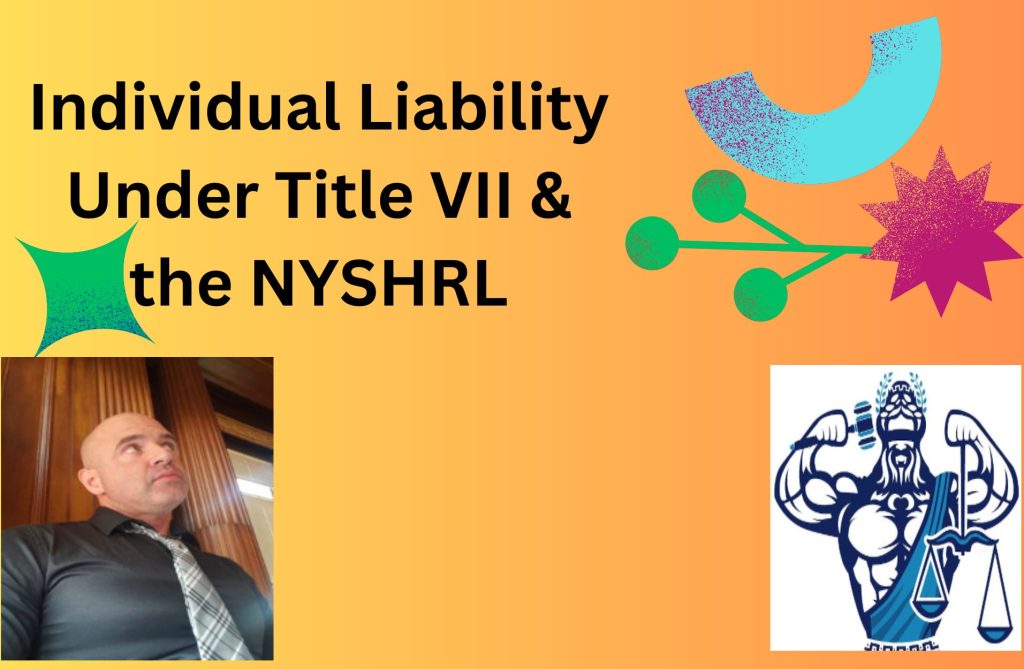Are you looking for legal representation? How much do you value your time and hard-earned money? Then look no further because whenever you require legal representation, the Law Offices of Vincent Miletti, Esq., the Strongest Name in Law, got your six. We are the authoritative force in Employment & Labor Law, providing diverse legal services in both a traditional and online, web-based environment, whether it be for small or large-scale businesses on a panel or a case-by-case basis. Hitherto, serving as primary counsel or cumis counsel, we are not only taking over the industry when it comes to Employment Defense and Employment Practices, but also in Intellectual Property Defense (Trademark, Copyright, and Proprietary Information), Management Side Defense, Regulatory and Compliance, Business Law & Corporate Law, and Professional Liability, among others. Whether serving directly or on behalf of a third party (EPLI, D&O, E&O), we stay unusually motivated® to take on all your needs!
You can agree with us that, at times, getting the right legal representation and finding a good attorney feels like trying to catch a fish while running away from a twenty-foot-high tide, especially when time and money are of the essence and the pressure of getting results before you move too far down the rabbit hole is building up. Certainly, only when you desperately need reliable legal representation, probably not from the types of Saul Goodman, will you understand the importance of having the right attorney by your side. So, do you need an attorney with the skills and legal expertise that match your needs? Operating in Brooklyn, New York, the larger New York City, and New York State, as well as in the firm’s new office located in Astoria Queens, your life-changing encounter with Vinny Miletti Esq., the founder and owner of Miletti Law®, whose legal expertise, knowledge, and experience has grown immensely over time since the firm first opened its doors is just an email and/or a call.
Still, in addition to providing legal services, you can concur with us that information is power, and, as such, we have diligently committed ourselves to creating a range of authoritative, trustworthy, and engaging content available on our website and social media platforms. In this regard, feel free to visit and follow us on Facebook, Instagram, Twitter, Yelp, and LinkedIn via the website, as well as subscribe to our Blog, YouTube Channel, and News Letter through https://milettilaw.com/blog and https://www.youtube.com/@MilettiLaw, and https://milettilaw.com/#7665b240-0790-4562-ac0f-9444f9f5165a, respectively, to enjoy such content aimed to keep our unusually motivated® readers informed about how diverse legal issues affect them and/or their businesses.
In this regard, this blog is Part XXIII of our series, “Key Employment Law Issues for Businesses & Companies in New York.” In Part XXII, we offered insight into things employers should consider when executing restrictive covenants and mentioned that to prevent them, following employment separation, from soliciting other employees to leave the business, soliciting clients/customers, misappropriating a company’s confidential information or trade secrets, or working for a competitor, employers need to execute restrictive covenants with new hires. Most importantly, they need to seek expert advice on how to draft restrictive covenants and the legal implications of doing the same.
To move this discussion forward, this blog is titled “New York Labor & Employment Laws on Drafting Non-Compete Agreements during New Employee Hiring & Onboarding” and is a review of things employers should consider when drafting non-compete agreements or clauses during the process of hiring and onboarding new employees.
New York Labor & Employment Laws on Drafting Non-Compete Agreements during New Employee Hiring & Onboarding
Employers can use non-compete agreements or clauses when seeking to prevent former employees from misappropriating or stealing trade secrets, proprietary, or confidential information, and/or using such information to benefit the new employer. Accordingly, in our blog titled “How To Ensure Non-Competes Are Enforceable” and accessible through https://milettilaw.com/blog/f/how-to-ensure-non-competes-are-enforceable, we mentioned that in a non-compete agreement, an employer and employee generally agree that the latter shall not start a similar trade or profession or work for another employer (a competitor) in competition against the former employer. Thus, an employee’s ability to work for a competing or rival employer is restricted.
However, when drafting these agreements or clauses, it is crucial for employers to understand that in New York, non-competes will typically only be enforced by courts to the degree necessary if the services provided by the employee are extraordinary or unique, or to restrict and deter a former employee from taking part in unfair competition by misappropriating, using, or disclosing confidential information or trade secrets.
However, employers should be careful when relying on the “extraordinary and unique services” doctrine despite the probability of this being enforced by courts. This is because, despite the existence of a few recent lawsuits in which restrictive covenants have been enforced based on the “extraordinary and unique services” doctrine, the unique employee exception is rarely relied on by courts when determining the enforcement of non-compete clauses.
Employers should also bear in mind that a non-compete agreement or clause should describe (1) the length of time the employee will be subject to and bound by the restriction, (2) the geographic area that the non-compete covers, and (3) the type of business/economic activities that the employee is restricted from taking part.
One key thing to note is that New York courts generally bar employers who engage in material breaching of an employment contract from enforcing restrictions incorporated in the breached contract. Notably, the enforcement of a non-compete agreement will not necessarily be barred in the cases when an employer initiates termination. However, courts will also consider the rationale under which the termination was initiated by the employer.
In Part XXIV of the series, we will, in a short blog titled “Blue Pencil Rule and Consideration of Non-Competes,” hammer on other key issues of consideration for employers when drafting and executing non-compete agreements.
As usual, stay tuned for more legal guidance, training, and education. In the interim, if there are any questions or comments, please let us know at the Contact Us page!
Always Rising Above the Bar,
Isaac T.,
Legal Writer, Author, & Publisher.
 314-648-2586
314-648-2586 CALL US NOW
CALL US NOW








